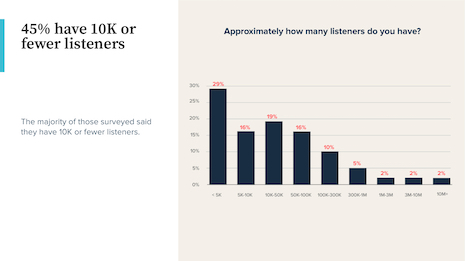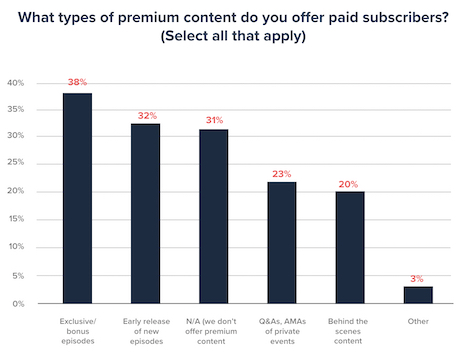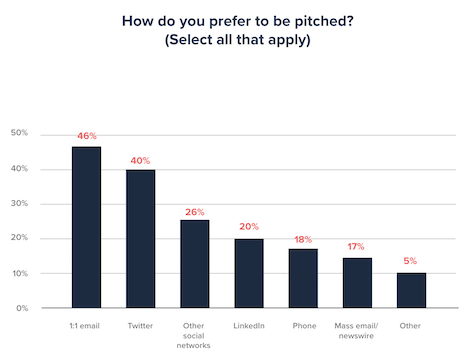Experts have no doubt that podcasts will continue to prevail in 2023, albeit alongside a few caveats.
According to media resource Muck Rack's The State of Podcasting 2022 survey, 64 percent of talent believe the medium will be more popular in the next two years. As the audio-based medium grows exponentially with every passing year, a look back at Muck Rack’s The State of Podcasting 2022 survey illuminates insights necessary to navigate the landscape this year.
For the report, Muck Rack surveyed 591 professional podcasters from Sep. 15 to Oct. 5, 2022. The average podcaster surveyed covers 3 industries.
Broadcasting live
Interestingly, 55 percent of podcasters believe the space is oversaturated with too many podcast options.
Their sentiments are, in part, substantiated by growth figures exploding from the sector, as it seems that more podcasters are producing greater amounts of content, spreading themselves across an increasing number of responsibilities and platforms.
 Image courtesy of Muck Rack
Image courtesy of Muck Rack
Muck Rack’s survey shows that 53 percent of podcasters work on two or more titles at a time.
Promotion and marketing — 45 percent — as well as hosting — 43 percent — and booking guests — 39 percent are the three most common roles for today’s talent, according to Muck Rack.
As popularity spreads, so do paywalls, per Muckrack’s results, as 35 percent more podcasters report offering premium content. More podcasters are also using paid subscriptions — these models saw a 12 percent uptick in use in 2022, per Muck Rack's survey results.
 Image courtesy of Muck Rack
Image courtesy of Muck Rack
Nearly 70 percent are also capturing video content of their recording sessions, upping the number of opportunities available for monetization.
The average podcast episode is between 20-40 minutes long, providing lots of supplementary time and ad break potential.
The corporatization of the space is also reflected in the rate of increase for representatives doing double duty and working for media companies, up 16 percent compared to 2021.
Marketing the medium
Luxury marketers’ greatest report takeaways are arguably to be found among its data-informed pitching advisories.
As it turns out, 81 percent of podcasts feature guests sometimes or often and 86 percent of podcasters receive pitches for people to be on their show.
Almost two of every five podcasters are prioritizing guests who pay to appear on their program.
Lastly, 45 percent of all podcasts have 10,00 or fewer listeners, per Muck Rack’s survey results.
 Image courtesy of Muck Rack
Image courtesy of Muck Rack
While many brands continue to see success in the space (see story), The identification of priorities (see story) — a brand awareness play may be advantaged by a sponsored ad slot on a show with greater listenership, versus a campaign seeking multicultural consumers, which may guide marketers towards more niche audiences via shows with matching listener demographics — is crucial today, with this statistic in mind.
“Podcasts continue to serve as a core component to any earned media strategy, particularly for reaching niche audiences,” said Mr. Galant, in a statement.
“Our survey showcases that while podcasters feel podcasts will be even more popular in the future, there is a consensus that there are too many of them,” he said. “Over the next few years, we’ll be watching closely to see how the medium matures, and how podcast publishers consider monetization as the space becomes more and more crowded.”
{"ct":"hNIX5EOHg8OCcz2t0HJ6xssRIjRxIkuIHztnFaRP0dw5Is29Xnen0iUVTTEGifIJ96XL1aOXPTrd9SxP17VCydX0nfTFSnIWS07G1XlX+wCLnIF9WhMWbn82Ezw7bdj4bXStYXXwbOD8vSZpRFjNYOXi6+02KGfKh5kgJ8+M+vlJi27+BVCdvtB\/Cjxy3HjQnvo0oUDD7aVmtdkxjvK5N2CZnucmvh\/yFZpZRETwEaX3etooDOlw5KLz7DdGYIRbDDB\/x+U\/RFCnLtOF+ArLI99+34PN96HIBPnzwX4qN5CrE+JU85RYlYhWd6ufVCd5R8\/MxNQ5ywJXORYYqe3\/20GJmyZlfSaZWt64vMIlUosazQR1X+kOB1YJ1fJaHEed4OamTxm+87DECbLQiay1qXslhMckRkMj41\/l4YcJN8bgiHzjUC\/1xq0WD4T8f3mlL9CBgprzMkRUCmNdHneFVRHA+\/rd2n\/H\/83T7uo4B\/as06KlncRzsFjAY77Mi4AalsD7pU4R3lfvX35gPbn8RMWNUhg6WeDFE\/TeAm5TdJ3m6r6LaTkCez4BLvFtVHLmJAcnAXmr6Iw7RsZ39Qm7Y9JHJ0iwp+r8c\/zZLoEfmvDxTlnbWuUpgmxriZxh4eBUl0A+7kIz82r1EpD7ancDGlS66YyY9aOL99tm0WWKMMkmE8jLlf6hWFN9\/U8LpgMoszoTjJ6\/95F+p5iSG\/5nU4kS1HmFsWOy387jE\/DUr7WolOQwoFM8V\/cU04anJ0Y7\/85ZzTqeJOPuD3AtzwGLQ49K8JKb2oHnH0r01DN2qUkBSWNBsWMuhieVeQvWR\/vDquKVbB0PkIbCTFBMZcgEmFXzvPkvwDEUgkLUM+07Mkb9HynJ7TNOglRXki3I4KGQEVwAHCRrJJIUejco6PyGlKmETfvhfhANvJDc+2Qr2IeIFEWdbvuKaIW8c4Ku21RbOFvnKty1nj0boj0Ia\/gDORklMq70qJRfnYK5d32WtDUb74XhLI9QEuZhI1PIcGwXFgYYVPpOCnIVBA6KxzDvyNesb8+OlaffeDtQV2K3zGIiOFf8AIdUH8MGiVY7Ygm+CAfz3SHE58\/5A08sO36hbjFVuTmAhEutLbNVZIdqHl3\/Zce8\/DXs8XKBeVsHBJkfS3t6528lmh3qiWV5WAAX8MzGZgXnOpyenM+P8n42dXyte1xDYYenZPxyAIlWpwnq1nduByrX5+DaNcgYFjoRTYEqOaFe9j\/m4npG8Cxk1XiE0cHDH3Bp99PwOLYfmP52spGrFaFbLtUhJSxm8ngUi2Wvt7T84G6+rF62B2zVD4m9hFJSbraJrBl\/0yc5fH1K9HkVm2BMQ0EcsRtpQF8hSlDMhWOsXdvgGJqYQ\/Kn1rBMz0lBg19HD2NYdjvV\/h8FyPrQuSRd+Wa7Xajn8Ciacqhbzd2KqIFlJ0nM6PFzXqUSBilMlYGn5wwsybScf7I6nNOPaaZCFB\/kjHSzZC\/wd8qbeNsm99ALv4bvSBD6gyMRZkNjrd750rkEmW2ApvtIU3JMrGJi4Uc4uTtnHdZz4VsIHHXQhy5EM9mto7ytiDSaL2BaYxX7o9iJbmtejTDgz\/RTtpxaEJTohQz7cX7ps9g1y4kiAj4a+TMYLzPiEW1YUIukOdVlOqytxilnvq+zTTRycuY5Ypox3gelOCfI0JGKB7NgiCFqWICyFYxPzU6I79RMBKAhmISIoeTjXDfyc3dxi1W6QfEUgA6Fzmcu1P\/dhPal+bnrjnXqK57dr5suqrY5WCL6mYu+\/EiKLJUu01mTx83kcI7PQ7Mq16nwFze9qei41xJgTE4yHt2cX7z40dTjC8LJ1LxR4Fie+AGukpZ1SGKXcvxAPtyBN493V4IA9EDPB8xHuatzimWVniGORmL8RXnzuoVFd2T61OaI0EOVybGDJsoIqb2qqfe3lWeoq9oG\/XrLVvtlQCXozD\/tZ6f3xT\/2TfFsE1mYJypfzPM6Iagb4kUxqMHAbLAvZe2q4CPWbLyTdVjAH0YaRC2Yp9K+T0U65fDkvtGh2TAk+ygeRuUGcCGN\/rzueazN0aWTWxECCo7Q4DBvyPqkHpqD1I9OOOGHTxHEdp+6yJqBxSyWAyvy8nU+BGJ0l42yB+qvWtg7kDf8tgDcoVD03RKsyf6o2qbFFxkAKmbfGmqUHgvv1H4NAPlroHB7jPu8IWeq3WSoyuXKCt5ugAvJwqwURooJYUshRs0dMQhyuKpz4GdHO2nACwy6iGabS1kk+PJCx6n+3L4NhgyUKWl3GQZG8Q28Ry0mN2ClgS0TcmS0l3NN89jHXu6fVHvav\/q60SG9GjG\/cmGWcZDimPXCAl+ThHg+YluIuO6vH8kLbTIf8tZvQ3PralSMahi0oxIqRLHWrRtvauApHtWKqp+VTSLDzv3eIa78P1Q42ieYb7dL2+y3x4ozxG+kuH8RV3RMyTKraEeEtsbqTxBN0\/IcIj4v0wGXj4uIOmesP2HCP0EZwCJhjh6l5ZmL2StOYpYVFNRza0YdM++kzpoM\/HY1oDhG0GqSr+ARLMg1VBlcE25Zu0OlYB2RBZZpgWT\/yCuJwAas8kHqEoFBgac1vaemprcahZbVlSnL9NvFbsTlwALFCXNa\/RJzfiFZuI34nAS8G8av4JuT3+\/4DqvQp7axljyKnL3vtGugi10BVpfXtCJcXfwJazmtLzjmA8GH\/FdnWshCId0l3LH9hnefLEf\/yXAKAbXubsmS7O8ZZcswB5hjc4xBi7N9QycYgSriZVyjz4kM6W96gOw7u28dO3XUYBDpStH0i6S4WV8ennlulEQIpNo8Dp6H+JkkGO3hO+izXs3vdZQ0C3lTzuT9V9Gyyf0uXcLNc0bLH9Dq+TYmvHjI2lH2Z10jDXU6dcUAjHjSmU4e6rCNJB4ZNqMbL7c2WREBPeXbCi25kNJaEQdZOfRmZ7FbJjqsvzjOfQ7sf6p+qUTT8f9BctdhqOG6uI4Gd3WBLo2e8czEjhLVpbY4N9ixjR+NjznY1\/9w+Z7L0ZmVb6lVUZ02vG0CzBAz37KNANkLdosv8EABZmbyhqhTU3NW8JHEiqYggw5gDc\/vn95Ii9R\/Ogp2KGh5l2ZhpqUwZo\/iIE0pxBWsNBETlmLLQOC82h+guhaqEymVZKD7ag72VB9FbaQTIwVd7\/Qc+nocLMCnwp1RmY5Y6X2EwtP1W19xo10BWFSCzziYYTvxItiXIUghbcEXpxDbgNN8DCvysKuE77pxoueBouZbarDukcNmFt7kXUzNGQ9t7nbLTwaOVa4VAJLmzWwDfxr8AwfHKyJvUxVeDFiMfiNgInnCWrQIcy775eb+XC0pA86DJ6KFl9GITCYHPKSAtMjRAtA47WCtNoXsSsu0ljBKQ88Xp4Ti2gjT6r6NxGvC0q160+t\/vsf+KTO+7lOzLB\/IQ8bhvrA2ZcwXTLh\/+pI3Srkb2wILiFmeegJH7UXqKxMTT1FLajHeswS71lkSlzPRko5zPOyHm01nLSTbEFQQ8LqK6+B6tKNNmG1\/43EomLxtoSiMAs3KHdJwSO\/\/brIZY075Q3POgBee9+mGGXuH50r+FuMtPt4bfngH14K\/LuL4l3ae50r6STlVzYMAYDokcQic54JQp6m2IVnBpn5YmPvpB4y5eyzxMRel8AmK9Gp0M1JGt7SpklbQFduEUeNpPEjasCu7WrLmRtWccmMMuBqkpiTEn\/ulAxsFlsdw36NBPBmZQn1GQ+KH1uXNASdVTIGyvUI7ta\/AJb+MgMicUFUekbN1CuODKUNfu9kMI8OwZAao2bzI4ULiL69VWLqf3QHHE+v+v+HdLauZ6tALk8FgsEBCKUl16JxtjF76EGrrZcJ6epnmnf2mHrWI0JxOo2qV4Z57dSnbvfLMmfvo+GadmHchWk2Q076\/fEKATFdYXM3lTX3OE+l4Bg9C3WG5YoQ7U83o2MYixGJ\/4T1pCFu1ddq9dQBN\/unRqDLuCJU17F+pGUDP4XRqWdsY0VWDD5biBbwTGOAstRzCNThk7bVZrhf4YFVLfx3VGRqU3OzZwuJdiohFi9hoaYrBx4xRDNp\/Mz5\/cWZr+Vg1F4dYE24oiUc3xZ8xNsORiFEInq9hZV7q\/y6rY\/uWh2FXHOQsOlD+tQ7BpDIxu7h7DjFy1d\/qOtyhVACiL\/KEWb5cTTTGQfPlw1WrWxuX53vGsEQCw2iYVg8ycmV\/23\/u2XtubYeov1jeLBQDEKV5wnhrhjSe6J+jUY+bIFbfaxbXtnnGCU8ZoZxneBzPZjiidTqy5gZwWvvLo3n\/Enk+YxuJWM4A5yv4qG7XMUSY3Qcp7qrfnNNH3Dx\/xlsWBUnElQekxgQTOSkxtrl9T8mP0KUT5iYB8OUhl2RkXeTfUMjjEhIvPlcYsFQMQReRWaP3B5jE+QgnP3PEEMLREDgkQHuLwiocUPy+eLUvBObKbzH\/6jwNU6eJXRaD9MUK93nU0PeXHcspDnWloScARdeCF75eaOmlRnKDlB8lRlrE66B1UYhV2UifTgsOAvn+bm4XximllAVo399miVNXYtrVICN+CkvUpC\/L7JhKuws31p0aGErdDTw1qC\/mEnmnafGcHvi\/HG7IwQ27U6AIQlqq57zT2FHqbtU8Bq9IkVvdkffEzfy5XXZdDOdQE6bOI5WRzzOF3yLzVSXmOWQYz2sjF4PUeOo3NhyqSqh72KknWdDOjBlRWgoKDBZRqvZA6QuUsCX+dwRkLdlEgiP4iXQjmydhsmw3egfMSwcfWwW4GMZrdQxyenTS436ypQbKi874FydKO5r7IzVnErO+whaipGHT4BBb3I6WuJiaKhKGK7+YgrFqrDNaOcd1Ob6DVWwTFpOgNUKwLpp1Ul\/AT\/g5RDbUyPrXWdZpKka9p66XpnHglD1UkhiCSnsKDMUSpYT\/\/zpsw7tlUNwHeiFNb8lELEyJL0PQRfV7gDZIa1bYU3VFvddlbQp9LjrZHdmo5jQH0\/cuzJYmVLob12XazAIkGoJSyApE0JAB5r2nfyaisaOaNOkBNXKI7oMO74Lz2GLo2CL1+Z0+KuGPVjHiPZfhkNBbj2UYUFpw7ThCnlL8\/iBh4L0X92lPq+Vm4\/xmo+zQXxpGmjvD48OPoEK5d9Uqfz4RJdv+suiYAATxk6dap5E69MomPLi6XC777OtB3vVXfZqSys8BunU3XUY0dxwL3l5iiPdyHcD8XL1MByYSorl1la4\/8JItUfkcwzF3QPl65AYdm7vS0O\/HQJyMu\/o+Vw6TCPemBC8DIIwDorjatyYUqgYK65key7Z+Dbn1fdkVSwp2LUh5IliBKzS7J\/VV0lkMl4Q7NXrl6hIHGPiOIuFmOUDbJ9pA0zhtx5nXNVxe2FgK6COChG\/onLEBMXOnJr1epQJ14bksxqVA7dbWvVZXA1mAZMqPj7mcDjAu\/xQI\/c+CV0EwZdpE1tL\/CO3nsJIq37j1tbceXzeMZraSrAwPT2j350f6WW1r2bJtKwiF4NTHhB8upaLV7NTfNnlNXWnruiz3HEdJYA+0fQeepIu7+E32ZTy\/y7v6Z3r9GU3GylIqmsLabbzggWPYHOSMlz27uD+fjDm9JQZ8EiO92Psc9n6Dp7GAMd0RRsWyf\/rbEEvVm5h2JGI55iSVqbuF+TZgYzZ0TAwTh0XzYkoGKCF\/yHSSTOIyIYpa0tnYoFZIrv\/Z5YZmsI6ZNAPoRnlFq2D\/H4LGEhk74cFB2EnQaoppKSjpTEXz9xpjWLKU0+a17isbZAeoUSCZ9Dc7KB4usw8GQaAHhMf4j4VBBeXz4029n5WwyY1GJWpb0reH06bHFQa5S7ZOHP7WTMWtxvdYity9VDr98K9LYe7VSerHMllKbSNVP9\/tpKXaSr4wlyWHfWQixWLkW9qZE3q28IaQGLWJjVTeG3twQk\/png7ZBXOG+1TqnkJqOPg6sE3kZ5bsIFEkMwDOJjhb5068MTsJPeBNuUsS3Hg\/92ua59v7iqfnQF9r+cfIqCBzMXSR+W7dJs2tWi8rAh6dUxkeEOVa6KuU7wSE1YUof8ZAgUSxFN55bTnVZVpAKQnf3i3zSpaOONTA\/1ZmYAtLoa0f2dcHQMCYGHhsEtqUz6xqMvvUASA8jndJyGso7BbMFwgfBR2+7gJ\/nBAxiiEVYxC37rkNJ99vxRb3Yc1t2b30hqIcRM0oxIW9Bjg8ADe+08PIyR+FP2CiAN6fuCkdzXowJ8JAu08\/\/L+9Wvg6ojZAUwAGkrx2KGTDMKACn9E1qPUViIKxz7xxQrz4\/N+dyewwL8X832gL\/GK0eJCHDAw5xDP6CICzS99rBMhtbkXQBMdBjj6FOyJ9wiGjZ9QRkQi1FEIbiV2FmMXLMxqm6FjvCLroBxmgPvHcyUzXaCENbDhkfQH1r4VhWm70n55zCOcdlsXYDXDOVdUIJfZBRHk9dW9SvJeqy2Yg3Oc8ynvod3+KQU2xW\/5RmDEldULNhUH3fJHhoQoQUtRYSC\/9ZPZ6HzM0eHEqwBnnRlGO+AYp1QP4NyDEQUVZvkq29neIZT+q7QZ5iMye3PWUQvms2lNmQ3Z1JIMOSZwM8PCEFT5JJj4CeDOVKvuqa2Ip760bBBrt8\/MWDr+lGo4VHHSb7eZyHH3dCJ2RhchxsdezHIz+tEWopMtj0lykdDX9IK0IEw79pDzd2bukqgeeWDmoKdcEsn7Es2QO1KcM8wzYCtyCx7X+6Lc7dnHteRAHLh0WpXBF2BrGb0aXB9sM\/9FcNMZzX0o7HFVCkk80\/6eCL+jLIx\/judLJu2dtS9AFdVE8dsPJPQcqVi6kqbVbuMgXYdLL\/7Pcyes8sWPwa6rNFkW9ljAnzWwwmcvu795HV71FthFXY3S\/T7URBKaZOsBW9zkkxC4OprCs9HOB7sIrLiCIA7Oeskj68eva36TuoCvK","iv":"5608eda2950f6a2ee8ceb7f0608dc0af","s":"ca84f6a97e41876a"}

 64 percent of talent believe the medium will grow in popularity over the next two years. Image credit: Hippopx
64 percent of talent believe the medium will grow in popularity over the next two years. Image credit: Hippopx